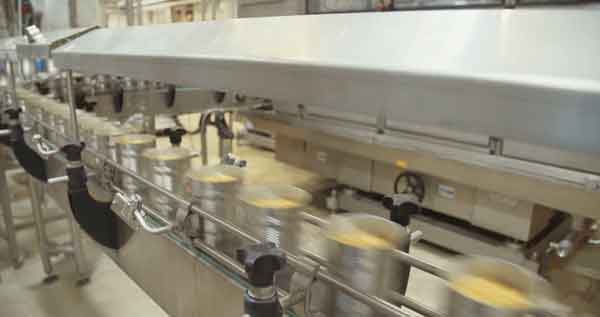Salting, drying, freezing and canning food are all methods for food preservation which have been around for centuries. Although the end, product has remained the same the methods to get there have changed drastically. The use of machinery and engineering are at an all time high.
Take for example a simple can of green beans. This item has been on the shelves for decades, but have you considered how much engineering is behind it? The beans need to be heated, canned and moved around the factory- that’s a lot of work! For everything to go smoothly food engineers are required. They are an essential professional in any food manufacturing plant!
Now that you have a taste of what an engineer does let’s give you a better picture with a general description of what an engineer is.
Food Engineers are types of engineers who:
“work solely with food products and the machinery used to process them. A specialized type of food engineer known as a process engineer researches and designs processing, handling, and packaging equipment used in manufacturing. They help to keep factories moving smoothly by creating more energy efficient practices and waste management tools. Alternatively, some food engineers are packaging engineers who design, test and implementing packaging designs for food products.
However, that is quite a broad statement because there are many different types of food engineers! Here are some of the broad categories that food engineers can fall under. Keep in mind that there can be overlap depending on the size of a company.

Types of Food Engineers
- Packaging Engineers- design, test and implement packaging designs for food products. Products require packaging with certain specifications. Ice cream for example requires a container that does not get soggy when the ice cream melts. Packaging engineers develop packaging which adheres to these standards because it helps to sell the product. However, before it hits the market shelves these engineers test extensively the packaging extensively to ensure that the packaging meets customer specification.
- Food Processing Engineer– The most commonly thought of engineers. Food process engineers (PFE) develop new and better processes in the processing plant. For example, when a new piece a machinery is going to be installed in a factory, the FPE might have been the one to design the machine.
- Food Product Designer– Sometimes the background of a food scientist isn’t enough and food companies need to bring in someone with an engineering degree. These engineers develop the food products you see on the shelves using their technical knowledge.
What education/qualifications are needed to become a food engineer?
There are many different types of engineers and the qualifications that you need depend on the type of engineer you are going to become.
A process engineer firstly needs to be accredited in other words have the title “professional engineer.” In order to get this title you must go through a fourstep process (in Ontario):
- Obtain a degree from an accredited engineering program
- A full list of accredited Canadian qualification can be found here
- Register as an engineer in training with your provincial or territorial engineering licensing body
- Two to four years of internship experience, depending on your province
- Write the professional practice exam or professional examination
A packaging engineer usually needs a background in packaging engineering or a related field such as a mechanical or industrial engineer. Packaging science majors will begin with courses relating to the general sciences as it provides a solid foundation. In the later years they will focus on concepts such as packaging design theory, polymer science and mechanical properties of packaging.
Unfortunately this field is fairly new and the only places currently offering it in is Conestoga in Kitchener, Ontario.
A food product designer usually needs an engineering degree in a related engineering field such as chemical or mechanical. This is because these programs introduce students to principles of thermodynamics, reaction kinetics and transport phenomena applied to food processes. These will help graduates to develop more shelf stable products and food preservation techniques.
Are you interested in robots and artificial intelligence? The a job as a mechanical engineer might be for you.
Why YOU should look for a career in food engineering
Demand
The food industry is known as the recession proof industry and do you know why? Everyone must eat. That is why becoming an engineer in this specialized field is a great decision. According to a 2015 Engineering Labour Report by Engineering Canada, the forecast of the Canadian economy is to produce 98 food engineering jobs between 2020-25 in just Ontario alone. In Quebec this number is 50.
Just from number alone we know there will be a need for engineers. So if you have the right education and credentials then you know that there will be job opportunities at the end of your degree!
1 Source: Engineering Canada Labour Report 2015

Opportunity to improve lives
Right now, the spotlight is on the food industry because of climate change and foods role in it. Being a food engineer will allow you to work directly for this cause by creating more energy efficient processes and packaging.
You will directly the lives of the consumers who consume the products your workplace makes and the planet too. There has never been a more exciting time to be an engineer!
Opportunity to innovate
People love engineering because they can create something never done before. Companies are always looking to innovate because it gives them the competitive edge, customers a better-quality products and increased profit margins.
If you love coming up with ideas ideas for the product & technologies of tomorrow and solving problems, then engineering is the job for you!
Competitive Salary
Engineers work for hard for their money. Some of the highest paying careers in the world are found in engineering. Their high level of skill and dedication leads to an understandable lucrative salary. According to Engineers Canada the median annual wage of a food engineer (defined as “other”) in Ontario for the year 2020 is expected to be $96,900 a year. That’s a decent pay check!






